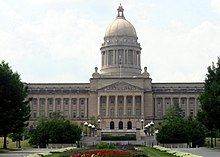Commonwealth of Kentucky House of Representatives
| Kentucky General Assembly | |
|---|---|
 |
|
| Type | |
| Type | |
| Houses |
Senate House of Representatives |
| Leadership | |
|
Senate Majority Leader
|
|
|
House Majority Leader
|
|
| Structure | |
| Seats | 138 |
|
Political groups
|
Democratic Party Independent Republican Party |
| Elections | |
|
Last election
|
November 8, 2016 |
|
Next election
|
November 6, 2018 |
| Meeting place | |
 |
|
| Kentucky State Capitol, Frankfort | |
| Website | |
| http://www.lrc.ky.gov/ | |
The Kentucky General Assembly, also called the Kentucky Legislature, is the state legislature of the U.S. state of Kentucky.
The General Assembly meets annually in the state capitol building in Frankfort, Kentucky, convening on the first Tuesday after the first Monday in January. In even-numbered years, sessions may not last more than 60 legislative days, and cannot extend beyond April 15. In odd-numbered years, sessions may not last more than 30 legislative days, and cannot extend beyond March 30. Special sessions may be called by the Governor of Kentucky at any time for any duration.
The first meeting of the General Assembly occurred in 1792, shortly after Kentucky was granted statehood. Legislators convened in Lexington, the state's temporary capital. Among the first orders of business was choosing a permanent state capital. In the end, the small town of Frankfort, with their offer to provide a temporary structure to house the legislature and a cache of materials for constructing a permanent edifice, was chosen, and the state's capital has remained there ever since.
After women gained suffrage in Kentucky, Mary Elliott Flanery was elected to the Kentucky House of Representative from the 89th District representing Boyd County, Kentucky. When Flanery took her seat in January 1922, she was the first female state legislator elected in Kentucky and the first female legislator elected south of the Mason–Dixon line.
Operation Boptrot lead to the conviction of more than a dozen legislators between 1992 and 1995. The investigation also led to reform legislation being passed in 1993.
Officially, Kentucky remained neutral during the Civil War. However, the majority of the General Assembly had strong Union sympathies. A group of Confederate sympathizers met in Russellville to establish a Confederate government for the state. The group decided to establish the Confederate state capital in Bowling Green, but never successfully displaced the elected General Assembly in Frankfort.
...
Wikipedia
